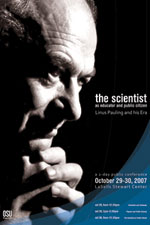Videos: Session 2: Popular and Public Science
Session Chair, "Popular and Public Science”
Cliff Mead (Ava Helen and Linus Pauling Papers, Oregon State University)
8:01 - Transcript Available
“On Bonding with the Public”
Bassam Shakhashiri (Chemistry, University of Wisconsin)
39:42 - Transcript Available
Through demonstration and discussion, Dr. Shakhashiri attempts to underscore the relationship between the public and the scientific community. He addresses the role of science in modern life and explores ways in which scientific literacy can be increased. Dr. Shakhashiri engages his audience through a series of striking chemical reactions, illustrating both the need for, and possibility of, communication between the public and academic spheres. At the heart of Shakashiri's talk is the firm conviction that "science is fun!"
“Circa 1951: Presenting Science to the British Public”
Robert Anderson (Cambridge / Past Director British Museum)
33:37 - Transcript Available
My theme is the Festival of Britain and its Exhibition of Science; and the Science Museum, which was still recovering after the War. Their approaches were fundamentally different. What was ironic was that the Festival exhibition was held on the site of, but not in, the Science Museum, the latter benefiting in the long term by getting the Festival's building. Some interesting characters were involved, Max Born, Jacob Bronowski and Frank Sherwood Taylor amongst them. Winston Churchill looked on critically at the whole Festival phenomenon, believing it to be purely political in intent.
“Bringing Chemistry to Prime Time”
Stephen Lyons (Moreno/Lyons Productions, Boston)
33:26 - Transcript Available
Few sciences have had more impact on the way people live than chemistry – yet few have been so thoroughly ignored by the popular media. While countless primetime documentaries have been produced on archaeology, astronomy, biology, earth science, engineering, physics and other sciences, only a handful have been made about chemistry. In this talk, a longtime producer of public television science programs examines why chemistry is The Neglected Science – and explores what producers, television executives, funders and chemists can do to bring more chemistry to Prime Time. Includes a clip from Lyons’ most recent documentary, “Forgotten Genius,” NOVA’s two-hour profile of the late African American chemist Percy Julian.
“Linus Pauling as an Evangelical Chemist”
Dudley Herschbach (Chemistry, Harvard University)
43:08 - Transcript Available
The great impact of Linus Pauling, on 20th century chemistry and molecular biology and in his campaign against atmospheric testing of nuclear weapons, was much enhanced by his skill, verve, and evangelical flair as a writer and speaker. This talk will emphasize aspects that ought to be emulated today in efforts to foster both more effective science education and public understanding and appreciation of science. Chief sources for my remarks are personal encounters with Pauling and stories heard from my Ph.D. mentor, E. Bright Wilson, who was one of Pauling’s early graduate students and coauthor of their classic text, Introduction to Quantum Mechanics. These provide a basis for speculating about what Linus might do with cyber-communication at his command!
Watch Other Videos
Session 1: Scientists and Textbooks
- Mary Jo Nye - Session Chair, "Scientists and Textbooks”
- Michael Gordin - “Periodicity, Priority, Pedagogy: Mendeleev and Lothar Meyer”
- Ana Simões - “Textbooks as Manifestos: C. A. Coulson after Linus Pauling and R. S. Mulliken”
- Ken Krane - “Making a Modern Physics Textbook: The Collision of Full-Time Commitments”
Session 2: Popular and Public Science
- Cliff Mead - Session Chair, "Popular and Public Science”
- Bassam Shakhashiri - “On Bonding with the Public”
- Robert Anderson - “Circa 1951: Presenting Science to the British Public”
- Stephen Lyons - “Bringing Chemistry to Prime Time”
- Dudley Herschbach - “Linus Pauling as an Evangelical Chemist”
Session 3: The Scientist as Public Citizen
- Chris Petersen - Session Chair, "The Scientist as Public Citizen”
- Tom Hager - “The Scientist as Celebrity: Pauling, The Media, and the Bomb”
- Lawrence Badash - “Science in the McCarthy Period: Training Ground for Scientists as Public Citizens”
- Warren Washington - “The Evolution of Global Warming Science: From Ideas to Scientific Facts”
- Jane Lubchenco - “Advocates for Science: The Role of Academic Environmental Scientists”
- Chris Petersen, Tom Hager, Lawrence Badash, Warren Washington, Jane Lubchenco - “Panel Discussion of Session III Topics”


